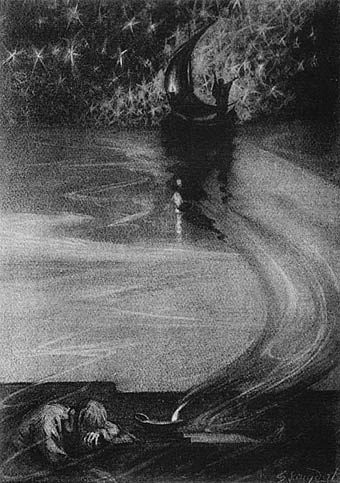Kalmar, Grant Park Orchestra and Chorus scale the heavens in Elgar’s “Gerontius”

The Grant Park Music Festival has served up so many memorable evenings this summer, it’s become a pattern, appealing in its simplicity: program a challenging work new to the festival and allow the conductor and the Grant Park Orchestra and Chorus to supply the richly inspired performance.
Carlos Kalmar returned to the Pritzker Pavilion Friday night for the final three weeks of the lakefront music festival, and Grant Park’s principal conductor led a vital, compelling, and richly communicative performance of Sir Edward Elgar’s epic, The Dream of Gerontius.
Elgar’s two-part, hundred-minute oratorio was a disaster at its 1900 premiere, with such inadequate rehearsal time and shaky soloists and chorus even the legendary conductor Hans Richter couldn’t pull it together. Yet the composer believed his setting of Cardinal Newman’s uber-Catholic prose poem to be his finest work, as well as a personal testament of the composer’s own Catholic faith. Subsequent performances in England soon gave Gerontius the stature and praise it deserved.
While Elgar’s orchestral music is firmly entrenched in American concert halls, Gerontius remains something of a curio on this side of the pond. Regardless of one’s creed, or lack thereof, Newman’s stilted Victorian prose hasn’t worn very well. The vast forces called for—large orchestra and double chorus, and tenor, mezzo-soprano and bass soloists—also mitigate against regular revivals.
But while Gerontius is not without its creaky moments, much of the score stands among the English composer’s finest achievements. The heaven-storming choruses and demanding solos for tenor and mezzo have a dramatic punch and spiritual intensity unique in Elgar’s output.
All credit to Kalmar and the Grant Park festival for the courage and audacity to tackle this difficult work and for pulling it off, with such a stirring, deep-textured and magnificently sung performance.
As with his idiomatic Enigma Variations in June, Kalmar has shown himself a completely sympathetic Elgarian, bringing a radiant, yearning quality to the lyricism and combustible power to the drama in this “journey of a soul.” The Prelude to Part One was emblematic, Kalmar pacing the ten-minute opening with rapt meditative expression and tensile strength. Climaxes throughout had daunting force and weight, yet it was Kalmar’s sense of the long line and grasp of the overall architecture that was most impressive. His handling of the half tones and subtle details was also notable, as with the sensitivity of the string playing in the yielding phrases of the Prelude to Part Two, and the long closing section. (Too bad so many clap-happy audience members insisted on applauding before the music ended Friday, completely burying the coda’s glowing benediction.)
With John MacMaster, Kalmar had a Gerontius to, well, die for. The Canadian tenor’s ardent singing possessed the requisite yearning in his tone yet with a reserve of strength to conquer the dramatic and technical demands. MacMaster delivered a stirring Sanctus fortis, and sang with fervent expression throughout, his rendering of O Jesu, help! Pray for Me, like a piercing cry from the heart. All the soloists were discreetly amplified, yet MacMaster’s voice seemed to flag a bit in the homestretch, with Take me away sounding rather effortful while still sensitively sung.
Conversely, as the Angel who accompanies Gerontius on his spiritual journey, Allyson McHardy started out less impressively, with words rather unclear. The mezzo-soprano grew in clarity, assurance and interpretive detailing as the evening unfolded, her refined tone conveying the Angel’s spiritual guidance while rising to the final scene with dramatic intensity.
The bass of the towering Paul Whelan is a bit high for the dual roles of The Priest and the Angel of the Agony but Whelan proved stentorian enough and admirable in these small roles.
As they have all summer, Christopher Bell’s Grant Park Chorus members once again showed what an outstanding ensemble they are. Enunciation could have been crisper at times in Part One, but they handled the varied assignments well, proving as convincing an ethereal chorus of Angelicals as a wickedly “uncouth” band of Demons.
Sir Edward Elgar’s The Dream of Gerontius will be repeated 7:30 p.m. Saturday at the Pritzker Pavilion. www.grantparkmusicfestival.com; 312-742-7638.
Posted in Performances




